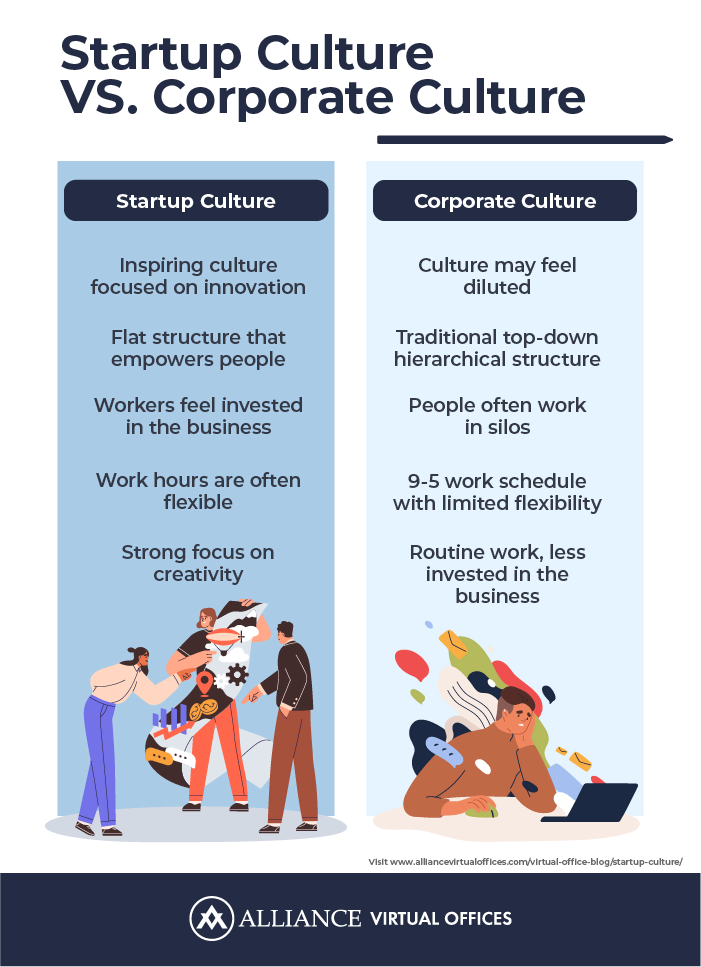Q: How have startups changed the way small businesses operate?
A: The skyrocketing number of startups has indeed changed the way small businesses operate. Startup culture allows the ambitious to thrive in a somewhat casual environment, leading to a shift in both employee and consumer expectations. This article explores how startup culture has impacted the market, and what that means for your business.
Small business formation is absolutely booming.
With the pandemic forcing many businesses to lay off employees, would-be entrepreneurs across the country suddenly found themselves with an excess of free time.
Without a stable source of income, these ambitious people had no other choice but to launch their own businesses.
And guess what? Some of them were successful.
This marks the continuation of an entrepreneurial trend that was well underway even before the pandemic. The modern world makes it easy for people to start their own businesses.
Perhaps this is why one of the most popular buzz phrases today is startup culture. Silicon valley innovators have shown us what’s possible with solid technical know-how and a winning idea. After all, companies like Facebook and Twitter were once startups.
Startup culture promotes the convenience and low barrier of entry for modern entrepreneurs.
The end result?
More people are choosing to work for themselves.
That ambitious spirit has permeated our social consciousness. From silicon valley to humble hometown beginnings, we love watching people build businesses.
But this cultural shift impacts more than just our social awareness. It has fundamentally changed the way we look at small businesses and, more broadly, work in general.
- What is a startup
- What is startup culture?
- What startup culture means for employees
- What startup culture means for small business owners
What is a Startup?
Before we get into startup culture, it’s important we have a strong understanding of what makes a startup a startup.
Startup Culture:
A startup is a small business that is in the early stages of development. In a sense, this means any small business can be defined as a startup at some point.
But that technical definition doesn’t encompass what it really means to run a startup.
When you hear the word “startup,” you might conjure up an image of an innovative new product or service – perhaps an app that makes life more convenient or a gadget that completely revolutionizes the way we work. And this is a correct association, as according to Forbes, innovation and progress are defining features of a proper startup.
These key factors are part of what differentiates a “startup” from a very small business in its early stages.
A startup is fresh, it’s ambitious, and it wants to change the way we do things. A startup isn’t just trying to compete with existing products.
Instead, startups are trying to create revolutions.
Obviously, not all of them are successful. Even the startups that make it don’t necessarily change the cultural zeitgeist.
But they try to. That’s what makes a startup a startup.
How is a Startup Different than a Small Business?
Startups differ from more traditional small businesses in a few key ways.
By definition, startups are in their earliest stages of formation.
A small business might be operating a small scale and yet fully formed. For example, a local grocery store that’s been in operation for decades might be serve a limited amount of customers, but it’s far from its earliest stages of development.
By contrast, a startup is just getting off the ground. It’s a small business with growth ambitions.
Startups are also different in the way they’re formed.
Traditional small businesses might launch with the help of small business loans, and they tend to follow the “tried and true” path followed by most businesses when they’re just getting started.
Startups can do this as well, but they may also go in a completely different direction.
For instance, one of the major sources of funding for startups is crowdsourcing.
Crowdsourcing is a form of funding in which the business asks for investments from individuals rather than from institutions.
The individuals are typically consumers interested in the startup’s proposed offerings. They invest because they want the startup’s products or services – and they may be rewarded for their early loyalty.
Crowdfunding also differs from normal investing because each investor typically invests a much smaller amount. Instead of a few huge stakeholders, there are hundreds or thousands of very small stakeholders who support the new business.
Sometimes crowdsourcing doesn’t even involve a stake in the company, as some startups actually sell their products or services preemptively.
For example, a clothing designer may design a jacket but lack the funds to launch a business and produce it.
In this instance, the designer could offer the jacket to the public with the contingency that they need to sell 200 of them before they can afford to produce them.
Consumers interested in the jacket can purchase it prior to its production. Once 200 are sold, the designer places the order and the jackets get shipped out.
This strategy allows startups to launch without having to surrender large stakes in their company or pay enormous fees on the front end.
These kinds of unconventional, modern strategies are a defining feature of startup culture values. They set startups aside from traditional small businesses, even though the two are fundamentally similar.
While these differences may seem minor, they have had a big impact on the broader market.
Have Startups Changed the Market?
When you compare startup culture vs corporate culture, it becomes clear that new trends have made the market much more open.
The viability of startups means that anyone can be an entrepreneur with the right tools.
Although starting a business once required outstanding credit, good connections, and a good deal of overhead, these barriers can now be easily surpassed in the modern world.
Startups often launch almost out of thin air. They leverage the connectivity of the internet to reach the people most interested in their products, regardless of their physical location.
That shift has impacted the way consumers look for products or services.
Rather than settle for whatever they can find, consumers expect to find “perfect fit” products or services.
For example, let’s compare a shopper 30 years ago with a shopper today.
Imagine a man looking for a t-shirt in 1990. He might have a number of preferences, like color and fit. He goes down to the local mall and tries a few on, finally selecting one from maybe five options.
That isn’t how modern consumers shop.
Today, that same man can easily go online and find a hundred options. Even if he’s just shopping for a plain black t-shirt, he will be absolutely overloaded with choices.
That overload means that consumers have become much more selective. They have to be – otherwise simply shopping for a t-shirt online would be a completely overwhelming process.
By narrowing down their options with more requirements and qualifications, they can find exactly what they’re looking for – and fast.
Startups have both created and perpetuated this development.
With innovative new products, untold numbers of startups now thrive in a market where specificity is king.
Startups have fundamentally altered the market by both saturating it and by solving niche problems.
Going back to our t-shirt example, the modern shopper can find an option that directly speaks to his very unique requirements.
There’s a t-shirt out there with the perfect hem length, the perfect collar, and the perfect weight for his tastes – perhaps made by entrepreneur who decided to create a startup that sold the “perfect tee.”
What is Startup Culture?
Just as a startup differs from a traditional business, startup culture differs significantly from typical business culture.
At the core of startup culture is a scrappy ambition that permeates nearly everything about the business.
Startup culture is fundamentally based on innovation and creating a product or service that isn’t just great, but truly revolutionary.
While the businesses might not always succeed to that degree, this driving ambition significantly impacts the business’s values and operations.
Where many traditional businesses are centered around simply finding a way to profit and grow, startups focus with an almost obsessive intensity on the idea they are bringing to the table.
The self-belief in the startup’s brilliance or originality is what gives this business its wings.
Just consider the way startups launch.
The scrappy insistence on the value of their idea means startups are willing to eschew traditional funding options and operate in ways that would have been considered “unprofessional” just a few years ago.
For instance, startups are very often run remotely. They don’t have a corporate office or an official storefront because they often lack the funds to afford one.
Even if they did have the funds, they likely wouldn’t use them for rent. The idea behind their product or service is what matters, and if entrepreneurs believe that this idea is good enough to succeed without a corporate office, then why rent one?
Startup culture also differs in its internal structure. Startup members and employees operate differently compared to more traditional businesses.
For one, startup teams tend to connect digitally rather than in person. Part of this is logistical. Since startups often don’t have offices, they don’t have a common meeting place for their employees.
But this choice is also one of inclusion and strategy.
Operating remotely means startups can pull from a diverse pool of talent. They can hire the perfect person for their business without having to worry about their business location.
This element of startup culture gives startups a distinct edge over traditional businesses. They aren’t limited to local talent – and this is particularly important given that many startups launch from small towns or cities.
Hiring from a wider range of talent also gives them access to a diverse set of perspectives.
Startups are often associated with progressive ideals, and much of this involves inclusion. By hiring and working with people from across the country, startups provide opportunities to people who might otherwise struggle to find work locally.
By including people of various backgrounds and locations, they gain an understanding that lets them target their potential customers and refine their offerings with more precision.
The final defining aspect of startup culture is a casual, fun atmosphere.
Building on the fact that startups don’t subscribe to traditional ideas of professionalism, startups tend to value their employees as people first and workers second.
Startups aren’t interested in enforcing strict policies on their employees. Instead, they tend to focus on the actual work the employee needs to do.
Many startups offer flexible work hours and make a point to support their employees in finding a workflow that works for them.
While this approach may make them seem less organized from the outside, it allows them to simplify their workflow. Instead of micromanaging, they only have to keep track of what really matters to their business.
These are the things that define startup culture. Startups are ambitious underdogs that tend to hold progressive and inclusive ideals and view their employees as people rather than workers.
Is Startup Culture the New Norm?
Startups are transforming small business culture.
The sheer magnitude of startups made this fairly inevitable. NPR states that following the initial onset of the pandemic, startup formation skyrocketed.
Not only did the number of startups grow, but the number of traditional employees simultaneously shrank. The people launching these startups were largely the same people who had previously lost their jobs.
This means that the entire employment market shifted towards business ownership. The new ratio of startups to larger businesses was bound to impact business culture and norms.
But the rise of startups also proved that employees didn’t need to rely on employers for income. Seeing the success of other startups, many workers realized they didn’t need their employers to make a living.
As a result, employees began rethinking the unnecessary aspects of business culture.
Why drive to work if you can work remotely? Why adhere to a dress code when you can just as well do your work in your jeans and a t-shirt?
The great resignation highlights this realization. The majority of the employees who quit cite insufficient pay and a lack of general respect as the primary drivers of their decision.
Startups showed that there was no need to settle for these unpleasant aspects of work.
Now that employees have realized this, there’s no going back. Startup culture is now integral to the way people view employment and business operations.
It’s shown us what truly matters in running a business, and people aren’t willing to return to the unnecessarily complicated and unenjoyable ways of the past.
With this new set of expectations, startup culture has established itself as the new norm. While not every business will adopt the values of startup culture, there is increasing pressure for businesses of all sizes to become more flexible and idea-driven.
What Startup Culture Means for Employees
For employees, the new prevalence of startup culture means job hunting and career growth will likely transform in the future.
An increasing number of startups means that talented workers have endless options. While startups may not be big enough to hire many people, there are enough of them to make a difference – which each hiring at least one or two employees to fulfill key roles in the business.
Because there are now so many startups, employees can pick and choose from hundreds of startups. The dynamic between employer and employee has shifted, as the employee no longer has to settle for whatever they can find.
This fact is compounded by the consistent growth of remote work. Employees don’t have to search for local jobs, and they can just as easily work for a startup in their hometown as a startup halfway across the globe.
Startup culture has also made it clear that employees don’t have to work for businesses that don’t offer sufficient levels of respect or growth opportunities.
In the past, an employee often looked at a job – any job — as an undeniably positive thing. Regardless of who they worked for, they believed that they should work very hard to keep their job.
In the age of startup culture, employment is subject to a much more accurate cost-benefit analysis. The employee can truly consider how they feel about the business they work for and how their work meshes with the rest of their life.
If they don’t find their work compelling or they don’t feel properly valued, there are endless businesses that could use their help.
What’s more, these businesses are just starting – which means more room for career growth. If a talented employee shows their worth and helps a startup soar, they can expect their own career to follow in this upward trajectory.
In addition, startup culture has had subtle effects on how employees think about their employment.
The explosion of entrepreneurship following the pandemic highlights the fact that almost anyone can start a small business. The barrier to entry is much, much lower than it used to be.
This means that employees aren’t just considering which business to work for. They’re also considering if they should go into business for themselves.
Thanks to startup culture, employees are enjoying more freedom than ever. They know they can find employment that will value them, offer them career opportunities, and help them maintain a healthy work-life balance.
And if they can’t, they can always become a small business owner themselves.
What Startup Culture Means for Small Business Owners
Startup culture also has major implications for small business owners.
With the above-mentioned power and freedom the cultural shift has given employees, small business owners need to be more conscious than ever about valuing and supporting their employees.
If you have a star player on your team, keep in mind that they aren’t guaranteed to stay. If you want to keep them, be sure to provide them with plenty of freedom and flexibility.
As an added bonus, increased flexibility can help you cut back on unnecessary costs. The shift to remote work means you likely don’t need to rent an office unless you really need to.
A virtual office is an excellent alternative – giving you access to all the tools you need to register and maintain your business without the expensive rental costs of a traditional office.
The rise of startup culture also has implications for your marketing.
With so many products and services on the market, being specific with your targeting is crucial. Most businesses won’t succeed using a general approach.
Instead, focus on targeting a specific niche within the broader market. If you can position your product as the perfect fit for a smaller number of people, you might have more success than simply trying to please everyone.
With so many startup businesses looking to innovate, it’s very difficult to create a perfect product that everyone loves.
Finally, startup culture proves that small businesses don’t need to adhere to traditional norms to be successful.
Modern business culture is much more focused on the ideas and values driving your business than it is on how you bring your vision to life.
If you are unnecessarily complicating your business and workflow in the name of professionalism, you may want to reevaluate the way you work.
This doesn’t mean you should simply give up on being professional, but you might want to rethink your company image and culture for greater levels of success.
Your values, your commitment to quality and integrity — these things are far more important to your image than a dress code.
What Startup Culture Means for Your Business
While startups are technically just small businesses in their earliest stages, the reality of a startup is much more significant.
When we talk about startups, we tend to mean ambitious, innovative businesses. Startups want to change the world — both through their products and services and through the way they run their businesses.
And in a lot of ways, startups are doing just that.
Further Reading
- The Industry Leader Trap: Should You Ignore the Major Players?
- How to set up a Virtual Office
- LLC for the Digital Entrepreneur: What You Need to Know When Traveling
The rise in startups means business culture has fundamentally shifted. The success numerous startups proves that businesses can thrive without following the norms of decades past.
If you’re looking to launch a startup, Alliance Virtual Offices is here to help.
With a virtual office plan, you’ll gain access to a business address you can use to register while keeping the flexibility you need to grow.
Launch your startup today with Alliance Virtual Offices.











